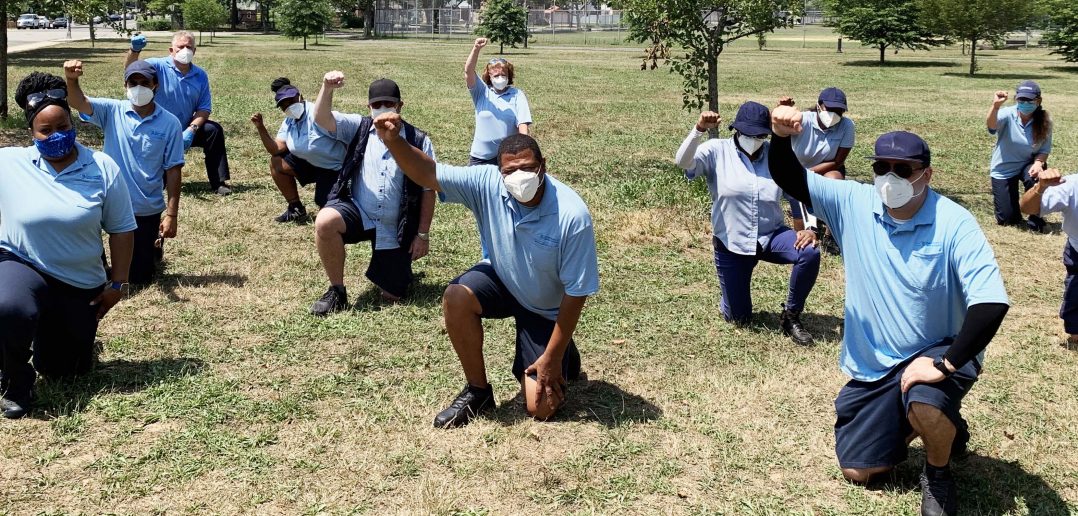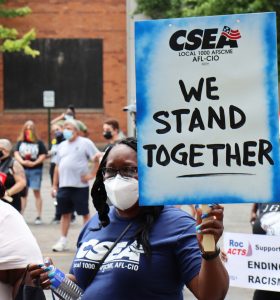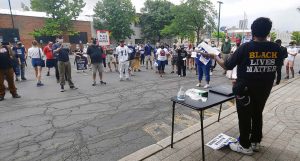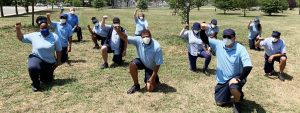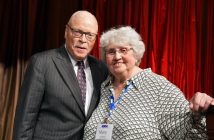The police murder of George Floyd in Minneapolis earlier this year not only sparked nationwide protests, but nationwide conversations about racial inequality, racial justice, systemic racism and racial violence by police and civilians.
During the 110th Annual Delegates Meeting, held virtually, CSEA members discussed the issues and what the union can do moving forward to work toward racial and social justice. Delegates also passed a resolution that expands education programs for union leaders and activists.
Educating members
After Floyd’s death, CSEA members across the state participated in rallies calling for racial justice. CSEA also reaffirmed our union’s support for racial equality and justice.
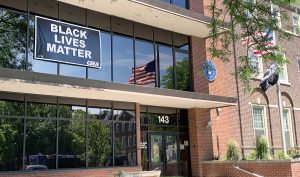
CSEA proudly hung a banner on the front of our union’s Albany
Headquarters building proclaiming that Black Lives Matter.
CSEA President Mary E. Sullivan directed that a Black Lives Matter sign be posted on the union’s Albany Headquarters building. She also stressed the importance of the union’s fight for racial justice in weekly emails to activists.
“Civil rights and labor rights are inseparably linked, and we must demand racial justice just like we demand labor justice,” Sullivan said. “Black Lives Matter and people have to start understanding that.”
The union’s Special Minority Issues Committee met virutally over recent months to find ways to make meaningful, long-term change within our union to increase cultural awareness and eliminate the effects of institutional racism.
The committee submitted a resolution calling for CSEA to expand on trainings offered by the National Coalition Building Institute (NCBI) as part of the union’s officer training and leadership development programs. The resolution also calls for CSEA’s Education and Training Department to develop training modules in areas such as implicit/ unconscious bias, equity and inclusion.

Cottrell
“The reason why Minority Issues Committee [members]felt like we needed to push this resolution is to get better cultural diversity training. We have a lot of officers who have not had diversity training and how can we represent the members if we don’t have the right training in place?” said Ali Cottrell, a Central Region activist and CSEA Special Minority Issues Committee chair.
Delegates approved the resolution during the Annual Delegates Meeting.
“This is going to make us a stronger union to have programs in place so everybody is being educated on systematic racism, implicit bias and more. It’s so important,” CSEA Executive Vice President Denise Berkley said.
Continuing the conversation
Delegates also discussed how the labor movement can play a role in working toward racial equality and justice during the plenary session Every Voice Counts.
The session was moderated by The Rev. Terrence Melvin, a former Western Region CSEA activist who serves as secretary-treasurer of the New York State AFL-CIO and president of the AFL-CIO constituency group the Coalition of Black Trade Unionists (CBTU).

Melvin
“The soul of this nation has been ripped open by a legacy of continuous systematic racism,” Melvin said. “What we are seeing these days is a manifestation of centuries of disenfranchisement and oppression.”
“We need to hold ourselves accountable about what we are doing,” Melvin said. “We need to find our voice for justice to demand it for everyone. [We all] need and deserve equality and justice and this can only happen if we get involved [in fighting for justice]. The members are struggling during these times and they need us to get involved and be out front.”
Joining Melvin on the panel were Maurice Mitchell, national director of the Working Families Party; CSEA Capital Region Executive Vice President Shana Davis and CSEA Central Region activist Tammy Honeywell.

Mitchell
“History is our teacher here,” Mitchell said. “While the Black Lives Matter movement and the Movement for Black Lives are only six years old, the movement for Black lives are as old as time and labor has played a key role in [achieving racial justice].”
Mitchell added that labor has long been a partner on behalf of racial justice, including today. He stressed that the labor movement and Movement for Black Lives is interconnected.
“We have seen the largest protest movement in U.S. history in the last few months,” Mitchell said. “We must organize together.”
Davis said that the Black Lives Matter movement has touched her life personally, recounting her family’s experiences after her 21-year old brother was killed while in police custody in 1991. For years, her family had fought to get justice, with the case reaching the (state) Supreme Court.

Davis
“The Black Lives Matter movement touched me personally because we didn’t have a Black Lives Matter movement then,” Davis said. “We fought this case for many years and we haven’t gotten justice for him yet.”
She noted because of her family’s experiences, she is thankful for a movement like Black Lives Matter
Honeywell became involved in advocating for racial justice through her work for the Onondaga County
Department of Social Services, where she saw and heard many stories of injustice.

Honeywell
“I hear so many stories [about racial inequality and injustice]and I wanted to be an ally for the [Black Lives Matter] movement,” said Honeywell, who is white. “It’s about talking to people and hearing their voices, and finding out what I can do to play a bigger part in this movement. I think it’s important for us as union leaders to be involved. We need to do more listening. We need to listen to their stories; listen to the pain. These issues are complex.”
Labor having an impact
On a national level, the labor movement is also working toward racial justice, with Melvin chairing the AFL-CIO Racial Justice Task Force.

McBride
AFSCME International Secretary- Treasurer Elissa McBride, in a video address, discussed AFSCME’s work in working for racial justice and equality and praised CSEA’s efforts in that work.
“You are doing important work … some of that is the difficult and necessary work of understanding systemic racism and committing to racial justice,” McBride told delegates. “You are rising to this important moment, in our union and in our nation, and I commend you for it. I’m proud to be part of a union that is now — and has long been — committed to racial, social and economic justice.”
— Janice Gavin
- CSEA Rochester State Employees Local President Renee Jackson attends a Rochester rally in support of racial justice earlier this year.
- CBTU Rochester Chapter President and former CSEA activist and staff member Deb Lee speaks to a crowd at a rally for racial justice.
- CSEA members employed at the state Department of Motor Vehicles in New York City take a knee earlier this year to fight racial injustice.
- Fareed Michelen, special assistant to the New York State AFL-CIO Secretary- Treasurer, addresses CSEA delegates about how the labor movement is fighting for racial justice.

